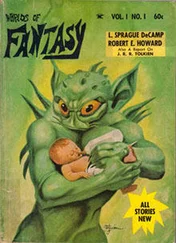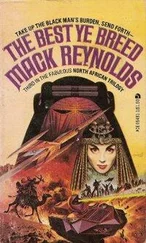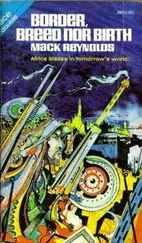The chips were down now.
The convoy, the motors growling their protests of the hard going even here at the gravel-bottomed wadi riverbed, made its way toward them at a pace of approximately twenty kilometers per hour.
The lead jeep—Skoda manufacture, Homer Crawford noted cynically—was some thirty meters in advance. It drew to a halt upon seeing him and a turbaned Arab Union trooper swung a Brenn gun in his direction.
An officer stood up in the jeep and yelled at Crawford in Arabic.
The American took a deep breath and said in the same language, “You’re out of your own territory.”
The officer’s face went poker-expressionless. He looked at the lone figure, dressed in the garb of the Tuareg, even to the turban-veil which covers all but the eyes of these notorious Apaches of the Sahara.
“This is no affair of yours,” the lieutenant said. “Who are you?”
Homer Crawford said very clearly, “Sahara Division, African Development Project, Reunited Nations. You’re far out of your own territory, lieutenant. I’ll have to report you, and also to demand that you turn and go back to your origin.”
The lieutenant flicked his hand, and the trooper behind the Brenn gun sighted the weapon and tightened his trigger finger.
Crawford dropped to the ground and rolled desperately for a slight depression that would provide cover. He could have saved himself the resultant bruises and scratches. Before the Brenn gun spoke even once, there was a Götterdammerung of sound and the three occupants of the jeep, driver, lieutenant and gunner were swept from the vehicle in a nauseating obscenity of exploding flesh, uniform cloth, blood and bone.
To the side, Abe Bakr behind his thornbush and rock vantage point turned the barrel of his Tommy-Noiseless to the first of the half-tracks. Already Arab Union troopers were debouching from them, some firing at random and at unseen targets. However, the so-called Enaden smiths were well concealed, their weapons silenced except for the explosion of the tiny shells upon reaching their target.
It wasn’t much of a fight. The recoilless automatic rifle manned by Elmer Allen and Kenny Ballalou swept the wadi, swept it of life, at least, but hardly swept it clean. What few individuals were left, in what little shelter was to be found in the dry river’s bottom, were picked off easily, if not neatly, by the high velocity automatics in the hands of Abe Bakr and Bey-ag-Akhamouk.
Afterwards, the five of them, standing at the side of the wadi, stared down at their work.
Elmer Allen muttered a bitter four-letter obscenity. He had once headed a pacifist group at the University in Kingston, Jamaica. Now his teeth were bared, as they always were when he went into action. He hated it.
Of them all, Bey-ag-Akhamouk was the least moved by the slaughter. He grumbled, “Guns, explosives, mortar, flame throwers. If there is anything in the world my people don’t need in the way of aid , it’s weapons.”
“Our people,” Homer Crawford said absently, his eyes—taking in the scene beneath them—empty, as though unseeing. He hated the need for killing, almost as badly as did Elmer Allen.
Bey looked at him, scowling slightly, but said nothing. There had been mild rebuke in his leader’s voice.
“Well,” Abe Bakr said with a tone of mock finality in his voice, as though he was personally wiping his hands of the whole affair, “how are you going to explain all this jazz to headquarters, man?”
Homer said flatly, “We were attacked by this unidentified group of, ah, gun runners, from some unknown origin. We defended ourselves, to the best of our ability.”
Elmer Allen looked at the once human mess below them. “We certainly did,” he muttered, scowling.
“Crazy, man,” Abe said, nodding his agreement to the alibi.
The others didn’t bother to speak. Homer Crawford’s unit was well knit.
He said after a moment, “Abe, you and Kenny get some dynamite and plant it in this wadi wall in a few spots. We’ll want to bury this whole mess. It wouldn’t do for someone to come along and blow himself up on some of these scattered land mines, or find himself a bazooka or something to use on his nearest blood-feud neighbor.”
The young woman known as Izubahil was washing clothes in the Niger with the rest but slightly on the outskirts of the chattering group of women, which was fitting since she was both a comparative stranger and as yet unselected by any man to grace his household. Which, in a way, was passingly strange since she was comely enough. Clad as the rest with naught but a wrap of colored cloth about her hips, her face and figure were openly to be seen. Her complexion was not quite so dark as most. She came from upriver, so she said, the area of the Songhoi, but by the looks of her there was more than average Arab or Berber blood in her veins. Her lips and nose were thinner than those of her neighbors.
Yes, it was strange that no man had taken her, though it was said that in her shyness she repulsed any advances made by either the young men, or their wealthier elders who could afford more than one wife. She was a nothing-woman, really, come out of the desert alone, and without relatives to protect her interests, but still she repulsed the advances of those who would honor her with a place in their house, or tent.
She had come out of the desert, it was known, with her handful of possessions done up in a packet, and had quietly and unobtrusively taken her place in the Negro community of Gao. Little better than a slave or Gabibi serf, she made her meager living doing small tasks for the better-off members of the community.
But she knew her place, was dutifully shy and quiet-spoken, and in the town or in the presence of men, wore her haik and veil. Yes, it was passing strange that she had found no man. On the face of it, she was getting no younger; surely she must be into her twenties.
Up to their knees in the waters of the Niger, out beyond the point where the dugout canoes were pulled up to the bank, their ends resting on the shore, they pounded their laundry. Laughing, chattering, gossiping. Life was perhaps poor, but still life was good.
Someone pretended to see a crocodile and there was a wild scampering for the shore. And then high laughter when the jest was revealed. Actually, all the time they had known it a jest, since it was their most popular one —there were seldom crocodiles this far north in the Niger bend.
There was a stir as two men dressed in the clothes of the Rouma approached the river bank. It was not forbidden, but good manners called for males to refrain from this area while the women bathed and washed their laundry, without veil or upper garments. These men were obviously shameless, and probably had come to stare. From their dress, their faces and their bearing, they were strangers—possibly Senegalese, up from the area near Dakar, products of the new schools and the new industries mushrooming there. Strange things were told of the folk who gave up the old ways, worked on the dams and the other new projects, sent their little ones to the schools, and submitted to the needle pricks which seemed to compose so much of the magic medicine being taught in the medical schools by the Rouma witchmen.
One of them spoke now in Songhoi, the lingua franca of the vicinity. Shamelessly he spoke to them, although none were his women, nor even his tribal kin. None looked at him.
“We seek a single woman, an unwed woman, who would work for pay and learn the new ways.”
They continued their laundry, not looking up, but their chatter dribbled away.
“She must drop the veil,” the man continued clearly, “and give up the haik and wear the new clothes. But she will be well paid, and taught to read and be kept in the best of comfort and health.”
Читать дальше












